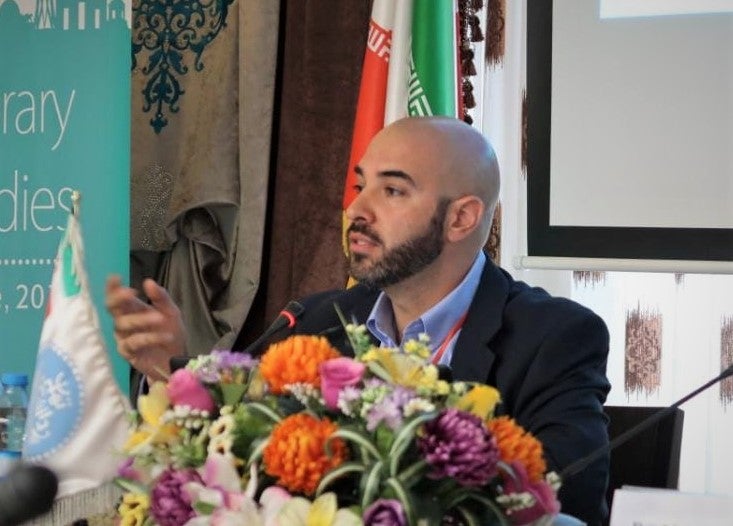The Ongoing Struggle for a Qatar 2022 Narrative

Two years ahead of the first FIFA World Cup in the Muslim world the existing narratives surrounding it are far from reaching common ground, let alone converging on an optimum discourse regarding the world-class gathering. As the tournament approaches, focus on the event—and curiosity about its host—has intensified, and all kinds of explanatory discourses have multiplied in popular media, academic research, and political rhetoric.
The celebrations for Qatar’s designation as the organizer of the 2022 World Cup were overshadowed by an almost immediate multi-party smear campaign against the country. Simultaneously, however, there was an unmatched opportunity to globally showcase Qatar. Among Doha’s aims, perhaps the most challenging and ambitious one is to prove to the world the compatibility of Islam and “modernity.” When the first public declarations against Qatar’s winning bid began, both the Organization for Islamic Cooperation and the Arab League sent a strong message, calling on their members to fully support the Gulf nation—a narrative involving broader Arab and Islamic elements to defend identities beyond borders.
For many commentators in the West, Qatar’s World Cup inevitably stokes misconceptions and misrepresentations, associating the Muslim world with terrorism and “anti-modernity;” it had even been referred to in the yellow press as a “Qatarstrophe.” The Israeli academic cluster led by Samuel Azran has exhaustively written on Qatar’s use of the World Cup as an “image-cleanser.” In the context of the blockade, several Emirati and Saudi media outlets and research centers have released “risk reports” to discourage investors by forecasting the “unfeasibility” of Qatar 2022.
During the first peak of COVID-19, the Secretary General of the Supreme Committee for Delivery and Legacy, Hassan Al Thawadi, reiterated that Qatar 2022 will be “the most accessible World Cup ever” and “an exceptional experience” capable of uniting the world after the pandemic. On the other hand, to date, Amnesty International has issued 241 documents and reports questioning Doha on its human rights records, from which at least a third refer directly to the situation of migrant laborers working on the World Cup infrastructure. On this matter, Denmark could become the first country to cancel its participation if its Parliament endorses the public petition organized by the nationwide Danish Football Fans’ association, which seeks to boycott the World Cup.
Besides the questions around alcohol consumption and dress codes, an even more sensitive topic was addressed in December 2020 by Qatar World Cup’s Executive Chief, Nasser Al-Khater: LGBT+ rainbow flags will be permitted in stadiums and elsewhere during the event. Activists are using the occasion to trigger such changes in local Qatari laws with lasting effects on the social fabric. The gradual relaxation of social norms might serve as a valve to release mounting domestic and international pressure. This argument informs the hypothesis stating that this mega-event might help the country to appear exponentially more open and progressive without undermining its existing conservative sociopolitical structures.
Doha can design and control the content, tone and scope of the 2022 World Cup-related outgoing messages, but it cannot control the ways in which these are perceived—let alone those messages generated and disseminated abroad. Undoubtedly, Qatar 2022 rearticulates the grammar of mutual (mis)conceptions between East and West and the multiple layers within such a binary. Orientalism, ignorance, geopolitics, all play a role in fueling clashing narratives that are defining and redefining a yet-to-see global event.
The January 2021 lifting of the blockade against Qatar, stemming from the 41st GCC Summit where member states reiterated their commitment to support Doha in ensuring the success of the World Cup—came as a timely boost of optimism amidst the COVID-19 pandemic that has threatened to undermine the full potentiality of the “beautiful game” in the Arabian desert.
In the meantime, FIFA President Gianni Infantino has decreed that “it’s a World Cup like no other was or ever will be.” Stay tuned.
Article by Paulino R. Robles-Gil Cozzi, a PhD candidate at the Gulf Studies Center, Qatar University.
Paulino R. Robles-Gil Cozzi is a PhD candidate at the Gulf Studies Center, Qatar University and an Islamic Studies graduate from Hamad Bin Khalifa University. His research interests lie at the intersection of Islam, geopolitics, and the Global South.
Read more about the Building a Legacy: Qatar FIFA World Cup 2022 project here.
The posts and comments on this blog are the views and opinions of the author(s). Posts and comments are the sole responsibility of the author(s). They are not approved or endorsed by the Center for International and Regional Studies (CIRS), Georgetown University in Qatar (GU-Q), or Georgetown University in the United States, and do not represent the views, opinions, or policies of the Center or the University.